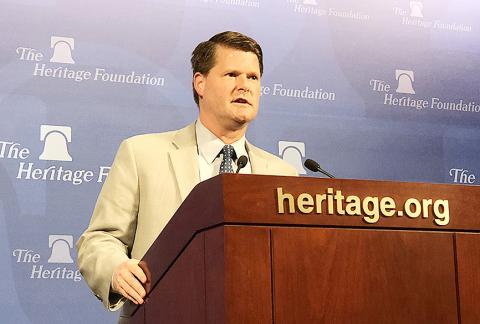The Ministry of Foreign Affairs (MOFA) yesterday reiterated its support for freedom of navigation in open seas, after US Assistant Secretary of Defense for Asian and Pacific Security Affairs Randall Schriver told a Washington forum that the Taiwan Strait is international waters and the US has the “right” to transit through and engage in activities there.
Schriver made the remarks on Wednesday during a question-and-answer session following his keynote address at an event titled “The Opportunities and Challenges of Cross-Strait Relations” organized by the Taiwan Foundation for Democracy and the Heritage Foundation.
He was asked by reporters whether the US would continue to send aircraft carriers through the Taiwan Strait as Beijing increases its military activity in the region.

Photo: CNA
However, Schriver said he would not discuss the US’ plans in the Taiwan Strait.
“It’s not our intent in any way to add to tensions or undertake activities that could raise the risk of accident or conflict, but I would suggest the party that’s been the most aggressive here is the China side and what would be most helpful is if China renounced the use of force and began to pull back the military means they’re using to intimidate and coerce the people of Taiwan,” Schriver said.
“It’s our intent to have a normal, routine, FMS [foreign military sales] relationship with Taiwan that is very much based on the threat we see from China and Taiwan’s security needs,” he said, referring to a US Department of Defense program.
“Our law gives us the flexibility to respond in an appropriate way” to the increasing Chinese military pressure on Taiwan, Schriver added.
All vessels are free to transit through international waters, Ministry of Foreign Affairs spokesman Andrew Lee (李憲章) said at a regular news conference in Taipei.
It has always been Taiwan’s policy to maintain smooth transit through international waters, and the freedom of navigation and overflight, Lee added.
Recent Chinese military activity has already heightened tensions in the region and raised concerns among other countries, he said.
The ministry will continue to closely monitor the situation in cooperation with national security agencies, he said.
In the face of a constantly growing military threat, the government is to speed up its investment in national defense and strengthen its self-defense capabilities, he added.
The government is also to fulfill its responsibility as a member of the region and uphold regional peace and stability, Lee said.
The ministry said it welcomed remarks by Schriver that “Taiwan is a partner in promoting a free and open Indo-Pacific and can make valuable contributions,” and his reiteration of support for military sales to Taiwan.

SECURITY: As China is ‘reshaping’ Hong Kong’s population, Taiwan must raise the eligibility threshold for applications from Hong Kongers, Chiu Chui-cheng said When Hong Kong and Macau citizens apply for residency in Taiwan, it would be under a new category that includes a “national security observation period,” Mainland Affairs Council (MAC) Minister Chiu Chui-cheng (邱垂正) said yesterday. President William Lai (賴清德) on March 13 announced 17 strategies to counter China’s aggression toward Taiwan, including incorporating national security considerations into the review process for residency applications from Hong Kong and Macau citizens. The situation in Hong Kong is constantly changing, Chiu said to media yesterday on the sidelines of the Taipei Technology Run hosted by the Taipei Neihu Technology Park Development Association. With

CARROT AND STICK: While unrelenting in its military threats, China attracted nearly 40,000 Taiwanese to over 400 business events last year Nearly 40,000 Taiwanese last year joined industry events in China, such as conferences and trade fairs, supported by the Chinese government, a study showed yesterday, as Beijing ramps up a charm offensive toward Taipei alongside military pressure. China has long taken a carrot-and-stick approach to Taiwan, threatening it with the prospect of military action while reaching out to those it believes are amenable to Beijing’s point of view. Taiwanese security officials are wary of what they see as Beijing’s influence campaigns to sway public opinion after Taipei and Beijing gradually resumed travel links halted by the COVID-19 pandemic, but the scale of

A US Marine Corps regiment equipped with Naval Strike Missiles (NSM) is set to participate in the upcoming Balikatan 25 exercise in the Luzon Strait, marking the system’s first-ever deployment in the Philippines. US and Philippine officials have separately confirmed that the Navy Marine Expeditionary Ship Interdiction System (NMESIS) — the mobile launch platform for the Naval Strike Missile — would take part in the joint exercise. The missiles are being deployed to “a strategic first island chain chokepoint” in the waters between Taiwan proper and the Philippines, US-based Naval News reported. “The Luzon Strait and Bashi Channel represent a critical access

Pope Francis is be laid to rest on Saturday after lying in state for three days in St Peter’s Basilica, where the faithful are expected to flock to pay their respects to history’s first Latin American pontiff. The cardinals met yesterday in the Vatican’s synod hall to chart the next steps before a conclave begins to choose Francis’ successor, as condolences poured in from around the world. According to current norms, the conclave must begin between May 5 and 10. The cardinals set the funeral for Saturday at 10am in St Peter’s Square, to be celebrated by the dean of the College